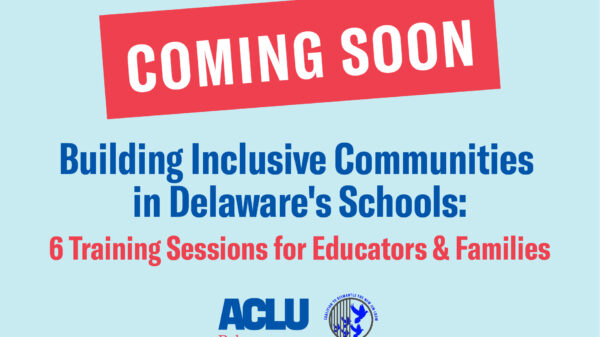Advocacy Training: Activating Change Agents
Advocacy Training: Activating Change Agents
Contributed by Network Delaware
This session supports development of leadership skills of educators and parents. The goal of this training is to get people involved in the school community and connected to equity-minded others in the city, state, and nation who are working as social change agents. The Fair Discipline training focuses on organizing and building advocacy skills to support community members (parents and teachers) in changing school climates that exclude students through excessive suspension and expulsion practices which are documented as significant links to the school-to-prison pipeline.
Prepare for this session:
- View Ted Talk by Karama Neal Promoting Social Change the Most Important Question.
Accessed online 9/16/2019 - View Ted Talk by Gerardo Calderon Social Change Needs Engaged Communities and Not Super Heroes.
Accessed online 9/16/2019 - View Ted Talk by Dara Frimmer Inspiring Change Through Community Organizing.
Accessed online 9/16/2019 - View Ted Talk by TJ Rumler What Are We Doing About School Suspensions.
Accessed online 9/16/2019 - Session Reference: Community Toolkit Getting an Advocacy Campaign Off the Ground.
Accessed on-line 9/16/2019
Session Objectives:
- Examine strategies for building an action focused community.
- Identify Social Justice issues that impact school climate.
- Identify steps to launching an advocacy campaign.
- Build awareness of effective advocacy practices.
A Suggested Icebreaker or Introductory Activity:
Have participants work with a partner. Have each partner team confide to each other the Super Power that they would like to have and their reason for wanting that Super Power. Have the pairs decide what as a Dynamic Duo the two would do [societal problem they would address], if granted the Super Power that each identified. The session leader might end the activity by describing the Super Power that he/she wants and perhaps identify the Dynamic Duo/s that he/she would enlist to address a societal problem.
Session Activities for Educators and Parents:
Guided Conversation #1: Community Organizing and Advocacy
- What is advocacy?
- Promotion of a cause
- Effort to solve a problem
- Effort to influence action in a community often done through community organizing
- Who should lead an advocacy effort?
- Do we need experts or known community leaders?
- What is the most important question for advocates to pose?
- What does it mean to “claim agency?”
- Identify action options
- Dismiss excuses
- Show grit/commitment
- Take a first step
Guided Conversation #2: From Personal Commitment to Influencing Others
- Is survey data your best tool?
- How helpful is social media?
- Are stories more powerful than survey data?
- Face-to-face interaction (1:1 interaction)
- Personal story that illustrates why the issue is important to you
- Invitation to others to share a story that will help you understand why they care about the issue
Guided Conversation #3: Launching a Fair Discipline Advocacy Campaign
Have participants work in multi-school level teams. Show the TJ Rumler Ted Talk. Teams should create a plan for the launch of a Fair Discipline Advocacy Campaign.
- What does Rumler share that might be useful in creating an issue flyer or invitation to educators or parents to get involved (attend a meeting)?
- What does Rumler share that would help you in hosting the meeting?
- What does Rumler share that would help you in identifying speakers?
- What action ideas does Rumler introduce that might be helpful?
A Concluding Conversation: Focus on the Issue of Poverty
View: Ted Talk by Jessica Sharpe: The Brain on Poverty.
- How are discipline issues connected to the issue of poverty?
- Whose responsibility is it to address the problems of poverty?
- Why are empathy, judgement, and perspective-taking important to developing the right responses to discipline problems that are rooted in social inequality?
- How might this Ted Talk be useful in securing broad community buy-in to direct private and public resources towards developing a school’s capacity to address poverty in the context of efforts to build an inclusive school climate?
Allow each school team to meet to record their preliminary ideas for putting the session content into action. Each school team is assigned to complete the Moving from Talk to Action form. What are next steps in the school’s effort to level the psycho-social “playing field” for their students?
Homework Assignment: Moving from Talk to Action
What steps will you take to advocate for planning that will allow your school to embrace one or more of the ideas that emerged during your Concluding Conversation? Include steps for educator to educator and parent to parent involvement.
After reading, discussion, video presentations, and reflection, what role will your team take-on to develop a Fair Discipline Advocacy Campaign in the school and connected community?
A Journaling Prompt:
Tell your story that illustrates why the issue of Fair Discipline and building inclusive community matters to you.
To Learn More:
University of Kansas Center for Community Health and Development (2019). Community toolbox. Chapter 30 Getting an advocacy campaign off the ground. Accessed on-line 9/16/2019. https://ctb.ku.edu/en/about-the-tool-box
Anyon, Y., Engelman, L., Scheider, A., Cash, D., Deryck, F., Downing, B., Meier, A., Pisciotta, L. & Turley, T. (2018). Delivering research to the field: Tools for training educators in proactive discipline. Denver, CO: Graduate School of Social Work, University of Denver and the Division of Student Equity and Opportunity, Denver Public Schools. Understanding the Issue of School Discipline Modules I & II

